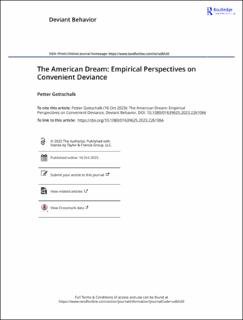The American Dream: Empirical Perspectives on Convenient Deviance
Peer reviewed, Journal article
Accepted version
Permanent lenke
https://hdl.handle.net/11250/3096809Utgivelsesdato
2023Metadata
Vis full innførselSamlinger
- Scientific articles [2181]
Sammendrag
This article presents a sample of ten American dreamers who demonstrated convenient deviance. The sample is derived from publicly available sources such as autobiographies by dreamers, media coverage, and investigation reports. The sample consists of four dreamers in the USA, two dreamers in Germany, and one dreamer in each of the countries India, Sweden, Norway, and Greece. While not at all claiming that the sample is representative of dreamers on the convenient deviance path, the individual stories provide insights into motives, opportunities, and willingness for deviance. The empirical sample of ten dreamers is analyzed in this article by application of convenience theory. Convenience theory suggests that convenient deviance can occur when there is a financial motive based on possibilities or threats, there is an organizational opportunity to commit and conceal deviance, and there is an individual willingness for deviant behavior. Specifically, this article addresses the research question: What convenience propositions might explain American dreamers’ deviance? Research results indicate the proposition of greed as motive, the proposition of status as opportunity, and the proposition of neutralization as willingness.

